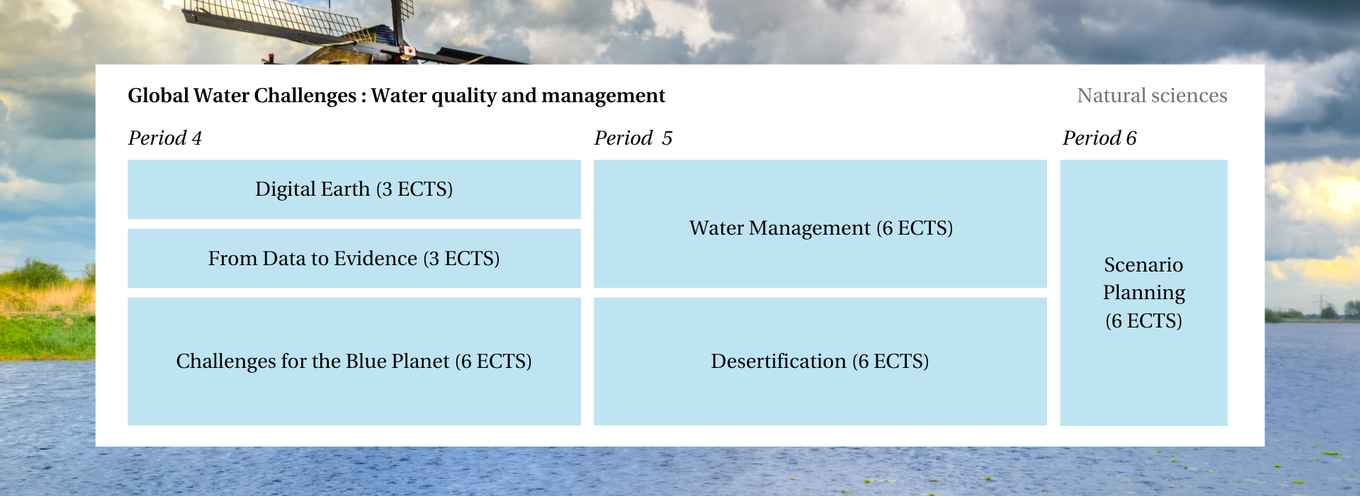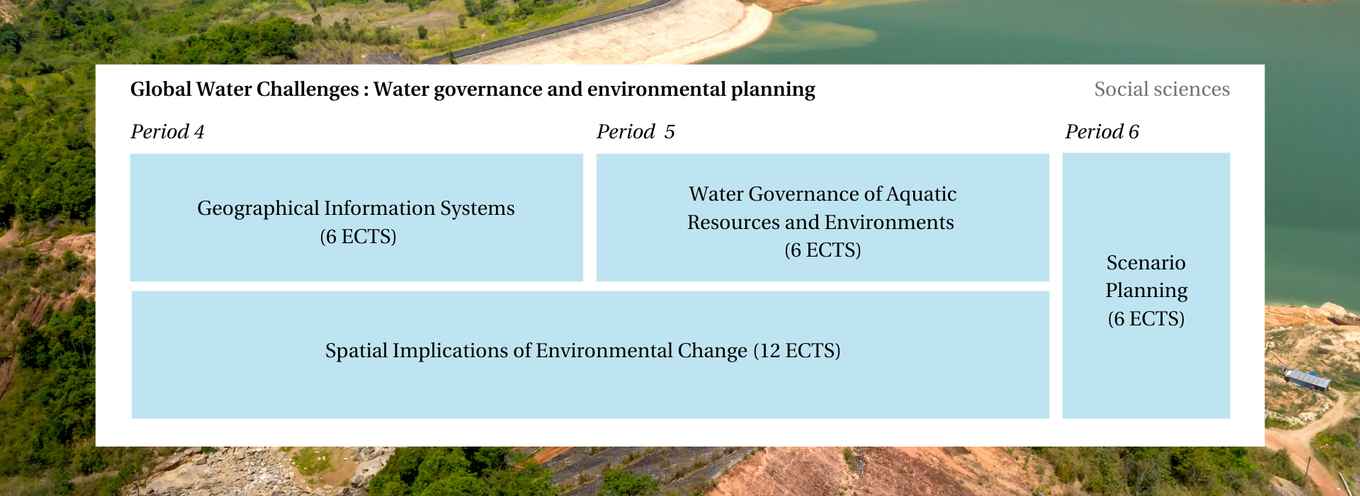Global Water Challenges
The Institute for Interdisciplinary Studies challenges you to explore the global water challenge: how can we achieve universal access to safe water for an expanding world population, achieve high natural water quality and safeguard ourselves against rising water levels?
In this minor you will learn about the water cycle and specialise in water quality and water management from a natural science perspective, or water governance and environmental planning from a social science perspective. The minor finishes with an interdisciplinary project that challenges you to explore future scenarios for sustainable water use.
Please note, this minor will start in February 2025.
Programme
The minor covers 30 ECTS and can be completed in one semester. Depending on your academic background, you can choose between two tracks:
Track 1: Water quality and management (natural sciences)
If you have a background in natural science, you can choose to specialise in natural sciences related courses that deal with water shortage and water surplus. The courses will teach you about the increasing desertification world-wide and the consequences of sea level rise. You will investigate what challenges this poses for us on our blue planet Earth. You will also learn how to use Digital Earth and other modern techniques to learn how to get from data to evidence in water-related research.
- Digital Earth * (3 ECTS)
- From Data to Evidence (3 ECTS)
- Challenges for the Blue Planet (6 ECTS)
- Water Management (6 ECTS)
- Desertification * (6 ECTS)
* The course Digital Earth prepares for the field course 'Desertification' in Southeast Spain (Murcia). The field course has limited capacity. The field course requires a personal contribution to cover travel and accommodation costs. We recommend Spatial Implications for Environmental Change (12 ECTS) as an alternative to Digital Earth (6 ECTS) ánd Desertification (6 ECTS).
Track 2: Water governance and environmental planning (social sciences)
In these courses you will examine the spatial implications of the expected environmental changes. Considering the growing global demand, questions about how to govern the use and availability of drinking water deserve serious attention too. Moreover, you will learn how to use Geographical Information Systems in the context of water issues and other related challenges.
- Geographical Information Systems (6 ECTS)
- Water Governance of Aquatic Resources and Environments (6 ECTS)
- Spatial Implications of Environmental Change (12 ECTS)
The Global Water Challenge
In a joint course on Scenario Planning, students from both tracks are invited to integrate and expand on the knowledge they gained to come up with future scenarios for the challenges we face on the waterfront and other, related domains.
- Scenario Planning (6 ECTS)
If you have already taken one of these courses or an equivalent, you may substitute it with one of the restricted-choice electives in the 30 ECTS programme from either track.
Entry requirements
The minor programme has a study load of 30 ECTS and is open to all Bachelor's students at the UvA and other universities. Candidates are required to have successfully completed - at least - the first year of an academic Bachelor's programme. English language proficiency is required.
The two tracks require specific student backgrounds. The courses in Water Quality and Management are open to students who completed at least 30 ECTS in natural sciences (e.g. earth sciences, biology, chemistry). The courses in Water Governance and Environmental Planning are open to students who completed at least 30 ECTS in social sciences (e.g. political science, social geography, urban planning).
This minor is open to international students with sufficient fluency in English, i.e. students who master the language at C1 level, shown by an International Baccalaureate certificate, an IELTS test score > 7 or a TOEFL test score ≥ 95, or earlier academic education in English.
The maximum number of students in the minor programme is 40. The minor is open to ‘bijvak’ students from other Dutch universities.
Application and Admission
Note: Information about minors for upcoming academic year 2025-2026 is up to date as of April 1, 2025. Therefore, additional information might be added to this page in the meantime. We advise you to visit this page regularly to stay up-to-date. Information about registration for this minor, which starts in February 2026, will be available on this website in November 2025. You cannot register for this minor yet.
More information and contact
Please contact Future Planet Studies of the Institute for Interdisciplinary Studies (IIS).
- Mode
- Full-time
- Credits
- 30 ECTS, 5 months
- Language of instruction
- English
- Starts in
- February

